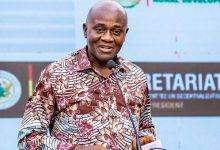
For two consecutive years, the Bono Regional Directorate of the National Health Insurance Scheme (NHIS) has exceeded the World Health Organisation’s (WHO) universal health coverage of 80 per cent in its membership drive.
The region posited 82 per cent and 81 per cent in 2020 and 2021 respectively of the Bono regional population onto the National Health Insurance Scheme (NHIS), a figure higher than national enrolment of 55 per cent.
The current active membership onto the scheme in the region stands at 973,247 out of 1,208,649,649, representing 89.6 per cent
Mr Joseph Mensah, Regional Director of NHIS announced this at the 2021 end-of-year performance review meeting in Sunyani, yesterday.
This feat, he noted, was as a result of a holistic and intensive public mobilisation drive by the scheme to achieve their targets.
On revenue mobilisation, he said the region realised GH¢8,096,698.54 as against GH¢ 10,608, 427.82 targeted, representing 76 per cent at the close of the year 2021.
Payment of claims to their accredited health facilities in the region had been prompt. He noted that the scheme had three months grace period to process claims before payment are done.
“NHIA has so far paid claims up to July 2021 with only six months indebtedness”, he stated.
Mr Mensah commended the staff at the district levels for working hard for the remarkable achievement.
“Indeed your various contributions has yielded this enviable achievement and we cannot thank you enough for your efforts, ” let me however be quick to remind us all that, going forward, we need to avoid complacency by working extra hard in order to sustain and improve on this wonderful recognition, ” he stated.
The Regional Director appealed for logistics such as vehicles, computers and accessories and furniture to enhance their operations.
The Senior Monitoring and Evaluation officer of NHIS, Mohammed Buguman, said late submission of claims, poorly prepared claims by providers leading to needles delays were some of the challenges confronting the scheme.
FROM DANIEL DZIRASAH, SUNYANI






